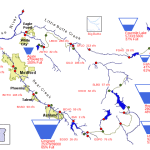Ashland Fiber Network (AFN) – Is It Fiscally Viable? City Budget Is On the Line – Watch for Developments Here
Ashland Fiber Network (AFN) – Is It Fiscally Viable?
In 2016, a concerned Ashland citizen and management analyst undertook an independent study of AFN and, in October of 2016, wrote an analysis of AFN including what it costs the city, and by extension, its taxpayers, to maintain and operate this publicly held utility. The results of this study raise several red flags concerning AFN’s ongoing fiscal viability and whether the City of Ashland should continue acting as overseer of this public utility.
Ashland Fiber Network was established in 1994 by city ordinance to offer an affordable, state-of-the-art, high-speed fiberoptic internet service to our community. At the time, most viewed this as a potential “gold mine” for the City. On July 20, 2004, the City Council unanimously approved authorization for the issuance of up to $16 million in revenue bonds to finance AFN. To date, the City has spent over $14 million dollars on AFN infrastructure including the laying of approximately 25 miles of fiberoptic cable. The debt service as of October, 2016, has cost the city $1.2 million dollars per year; the outstanding balance on the debt is $12 million dollars.
During the entire period of its operation from 1994 to the present, AFN has never been able to cover its operating costs including funding of its debt service, even during the peak of its customer base in 2005, when 4,000 customers were signed onto the service.
In May, 2015, the city established an ad hoc committee to examine the governance structure of AFN. (See http://www.ashland.or.us/CCBIndex.asp?CCBID=250). While this committee met several times and considered several governing models, no changes or recommendations emerged from their process. The committee did take note of problems with the status quo including:
- AFN governance is vulnerable to political whim
- AFN operations are subject to the requirements and constrictions of a public agency
- AFN suffers from inattentive and indifferent management
The findings of the private October, 2016 analysis include the observation that, under its current structure, AFN will continue to require funding from the City and that there is no clear path under its current structure for AFN to recover its costs. According to the current budget, the total annual operating cost for AFN is $2,219,846. Add to that the $1.2 million dollars in debt service, and the study concludes that AFN must bring in $3.4 million dollars simply to break even. Given the current customer base of 3,800 accounts, the result is a shortfall of $1.4 million, which amount the City must continue to subsidize.
The study’s most attractive alternative appears to be to reorganize AFN as a Public/Private Alliance (PPA) under which the city would outsource all AFN operations to a privately held company, which would receive all revenues in exchange for overseeing all operations including installations, infrastructure, personnel costs, marketing and billing. Under this arrangement, the City’s sole obligation would be to continue to service the debt, at a cost of approximately $7.88 per utility billing account. There remain neighborhoods within Ashland still unserved by AFN infrastructure. A private company might extend this infrastructure and also more aggressively market the service, even possibly extending service to areas beyond the city limits with an eye to increased profitability.
What is clear from this 2016 analysis is that the status quo is fiscally unviable and that there may well be an alternative that makes more fiscal sense, namely converting AFN to a Public/Private Alliance. We urge the City to give careful consideration to this alternative.






